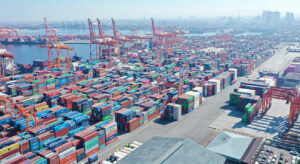THE International Maritime Trade Competitiveness Act is expected to address “unreasonably high” international shipping charges, which are holding back both importers and exporters, the Department of Trade and Industry (DTI) said.
In a statement, the DTI said that it is supporting such a measure, which will establish a regulatory framework for the maritime industry and protect businesses from unfair practices.
“This bill is a crucial step towards creating a level playing field for our businesses and ensuring that they can compete on a global scale,” Trade Secretary Alfredo E. Pascual said.
Mr. Pascual said addressing the charges being imposed by international shipping lines will help reduce trade costs, which “could significantly boost economic growth.”
“These fees are not only burdensome for our businesses, but they also undermine our competitiveness in the global market,” he added.
Under the proposed law, the Maritime Industry Authority will be given the authority to regulate shipping charges, which the DTI said will ensure transparency within the industry.
“The DTI’s push for the bill has been met with strong support from the business community, which has long been clamoring for government intervention to address the issue of excessive shipping fees,” the department said.
“With the backing of both the government and the private sector, the International Maritime Trade Competitiveness Act is expected to gain traction in Congress and eventually become a law,” it added.
Last week, 12 business groups, led by the American Chamber of Commerce of the Philippines, Inc., also called for the passage of the measure, along with 20 other bills.
The groups said such a law will help strengthen the oversight functions of government agencies over shipping charges, thereby institutionalizing mechanisms for the efficient movement of goods.
The other signatories to the joint statement were the Association of International Shipping Lines, Inc., the Canadian Chamber of Commerce of the Philippines, Inc., the Chamber of Customs Brokers, Inc., the Confederation of Wearable Exporters of the Philippines, and the European Chamber of Commerce of the Philippines.
It was also signed by the Japanese Chamber of Commerce and Industry of the Philippines, Inc., the Korean Chamber of Commerce Philippines, the Makati Business Club, the Management Association of the Philippines, the Philippine Association of Multinational Companies Regional Headquarters, Inc., and the Semiconductor and Electronics Industries in the Philippines Foundation, Inc. — Justine Irish D. Tabile
